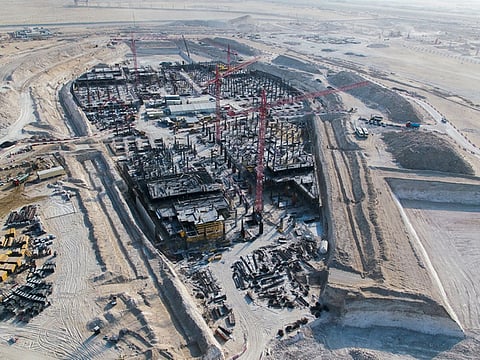SMEs a key focus for Dubai Expo
Expo official: UAE’s successful bid for World Expo was the SME bid

DUBAI: Expo 2020 Dubai’s three key themes are mobility, sustainability and opportunity. Tied in to all three of those are its emphasis on supporting start-ups and small and medium enterprises (SMEs).
In addition to Expo’s commitment to support fledgling start-ups worldwide through its ExpoLive project, and its commitment to allocate at least 20 per cent of its Dh25 billion spend to SMEs, the organisation has looked specifically at how to incorporate small businesses into the mega-event.
SMEs are the drivers and the lifelines to a lot of economies,” she said. “Even in terms of job creation and the largest employers, they’re the lifeline not just in the UAE — a lot of economies around the world rely on SMEs. ”
Manal Al Bayat, Expo 2020 Dubai’s Senior Vice-President for Business Development and Integration, takes that emphasis seriously. She’s spent a good part of the last few months travelling around the world making SMEs aware of the possibilities Expo offers and helping them gear up to take part.
“SMEs are the drivers and the lifelines to a lot of economies,” she said. “Even in terms of job creation and the largest employers, they’re the lifeline not just in the UAE — a lot of economies around the world rely on SMEs. And the greater the support we can provide is going to enable them to get bigger.
“If you look at the whole value chain, the larger corporates need the SMEs to be able to subcontract to to deliver certain components, and when those SMEs, the small become the medium the medium become the large, you will need more SMEs. You need the continuity. You need to make sure that you’re building a value chain that’s going to be solid moving into the future.
“It’s also one of the reasons Dubai bid to host the World Expo. It’s not a forced fit into the existing plans, it’s a natural evolution to what the UAE is planning, a natural part of what the UAE does on a daily basis.”
Al Bayat said she regarded the Dubai Expo bid itself as an SME compared to the rival bids for the 2020 Expo from Russia, Turkey and Brazil “in terms of geographical size, population size, even age.”
“Ultimately,” she said, “it’s not old you are or how big you are, it’s what you can bring to the table. It’s your creativity, it’s your innovation, it’s your resilience almost.
“Throughout the bid we were able to offer things that the other competing cities couldn’t. And that’s the key with SMEs.”
Expo began its business outreach in 2015, talking to firms small and large about plans for the event and what they would need from the business community.
It wasn’t a one-sided dialogue, she emphasised. “We had a really good dialogue with the business community, and with some of their input we’ve been able to go back and revise our plans just to make sure that they’re robust.”
Sometimes, Al Bayat said, the smaller firms needed encouragement. “SMEs don’t naturally assume that they will be able to deliver on a major event. They think the majority of the deals will go to a large contractor ... For SMEs specifically, we actually started at the beginning. We looked at our procurement portal and went through the whole registration process with an SME lens.”
The result of the review was a revision of the registration process to allow corporations, SMEs and even individual freelancers to register appropriately. Terms and condition agreements were revised to use plainer language.
Expo also ran training sessions on how to place a tendering bid. “We went through to process to make sure, ultimately, you’re providing a proposal and it’s going to be evaluated technically separately from commercially.”
In addition, while large corporations must lock their tender prices for 120 days, the lock has been reduced to 60 days for SMEs.
Payment terms have also been modified to suit SMEs, who sometimes struggle with cash flow, with 25 per cent advance payment for services and 50 per cent up front for goods and products. And once the service is provided or product delivered, the balance is paid within 30 days, while larger corporations are paid within 90 days.
“What we’ve done through this process is make sure that SMEs don’t need to pay to register, don’t need to pay to participate, there’s no locking of their liquidity, so that they can compete on as level a playing field as we can provide them.”
The results? So far, around 18,000 companies from 130 countries have registered for Expo, around 70 per cent of them SMEs. Of the 2,426 contracts awarded by November, of which 1,325 — more than 50 per cent — have gone to SMEs.



